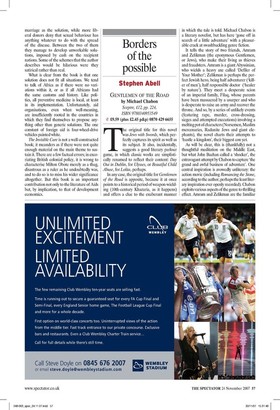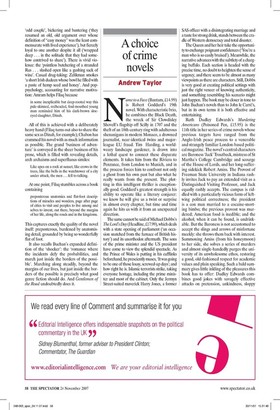Borders of the possible
Stephen Abell GENTLEMEN OF THE ROAD by Michael Chabon Sceptre, El 2, pp. 224, ISBN 9780340953549 © £9.59 (plus £2.45 p&p) 0870 429 6655 The original title for this novel was Jews with Swords, which perfectly captures its spirit as well as its subject. It also, incidentally, suggests a good literary parlour game, in which classic works are simplistically renamed to reflect their content: Day Out in Dublin, for Ulysses, or Beautiful Child Abuse, for Lolita, perhaps.
In any case, the original title for Gentlemen of the Road is apposite, because it at once points to a historical period of weapon-wielding (10th-century Khazaria, as it happens) and offers a clue to the exuberant manner in which the tale is told. Michael Chabon is a literary novelist, but has here 'gone off in search of a little adventure' with a pleasurable crack at swashbuckling genre fiction.
It tells the story of two friends, Amram and Zelikman (the eponymous Gentlemen, or Jews), who make their living as thieves and fraudsters. Amram is a giant Abyssinian, who wields a heavy axe called 'Defiler of Your Mother'; Zelikman is perhaps the perfect Jewish hero, being half adventurer (killer of men'), half responsible doctor (healer by nature'). They meet a desperate scion of an imperial family, Filaq, whose parents have been massacred by a usurper and who is desperate to raise an army and recover the throne. And so, by a series of unlikely events (featuring rape, murder, cross-dressing, sieges and attempted executions) involving a melting pot of characters (Norsemen, Muslim mercenaries, Radanite Jews and giant elephants), the novel charts their attempts to 'hustle a kingdom', their biggest con yet.
As will be clear, this is (thankfully) not a thoughtful meditation on the Middle East, but what John Buchan called a 'shocker', the extravagant attempt by Chabon to capture `the grand and awful business of adventure'. One central inspiration is avowedly unliterary: the action movie (including Romancing the Stone, according to the author; perhaps the least literary inspiration ever openly recorded). Chabon exploits various aspects of the genre to thrilling effect. Amram and Zelikman are the familiar 'odd couple', bickering and bantering (they resumed an old, old argument over whose definition of "easy money" was the least commensurate with lived experience'), but fiercely loyal to one another despite it all (wrapped deep. . . in the solitude that they had somehow contrived to share'). There is vivid violence: the 'pointless butchering of a stranded Rus . . . slashed open like a gushing sack of wine'. Casual drug-taking: Zelikman smokes 'a short Irish dudeen whose bowl he filled with a paste of hemp seed and honey'. And poppsychology, accounting for narrative motivation: Amram helps Filaq because in some inexplicable but deep-rooted way this pale-skinned, redheaded, foul-mouthed young man reminded him of his dark-brown sloeeyed daughter, Dinah.
All of this is achieved with a deliberately heavy hand (Filaq turns out also to share the same sex as Dinah, for example); Chabon has crammed his novel with as much information as possible. The grand 'business of adventure' is conveyed in the sheer business of his prose, which is filled with revealing details, arch archaisms and superfluous similes: Like apes on a rock at sunset, like crows in the trees, like the bells in the watchtower of a city under attack, the men ... fell to talking.
At one point, Filaq stumbles across a book containing preposterous anatomies and flat-foot descriptions of miracles and wonders, page after page of cities to visit and peoples to live among and selves to invent, out there, beyond the margins of her life, along the roads and in the kingdoms.
This captures exactly the quality of the novel itself: preposterous, burdened by anatomising detail, grounded by being so wonderfully flat of foot.
It also recalls Buchan's expanded definition of the 'shocker': the 'romance where the incidents defy the probabilities, and march just inside the borders of the possible'. Marching along steadily, beyond the margins of our lives, but just inside the borders of the possible is precisely what good genre fiction should do. And Gentlemen of the Road undoubtedly does it.







































































 Previous page
Previous page